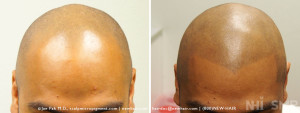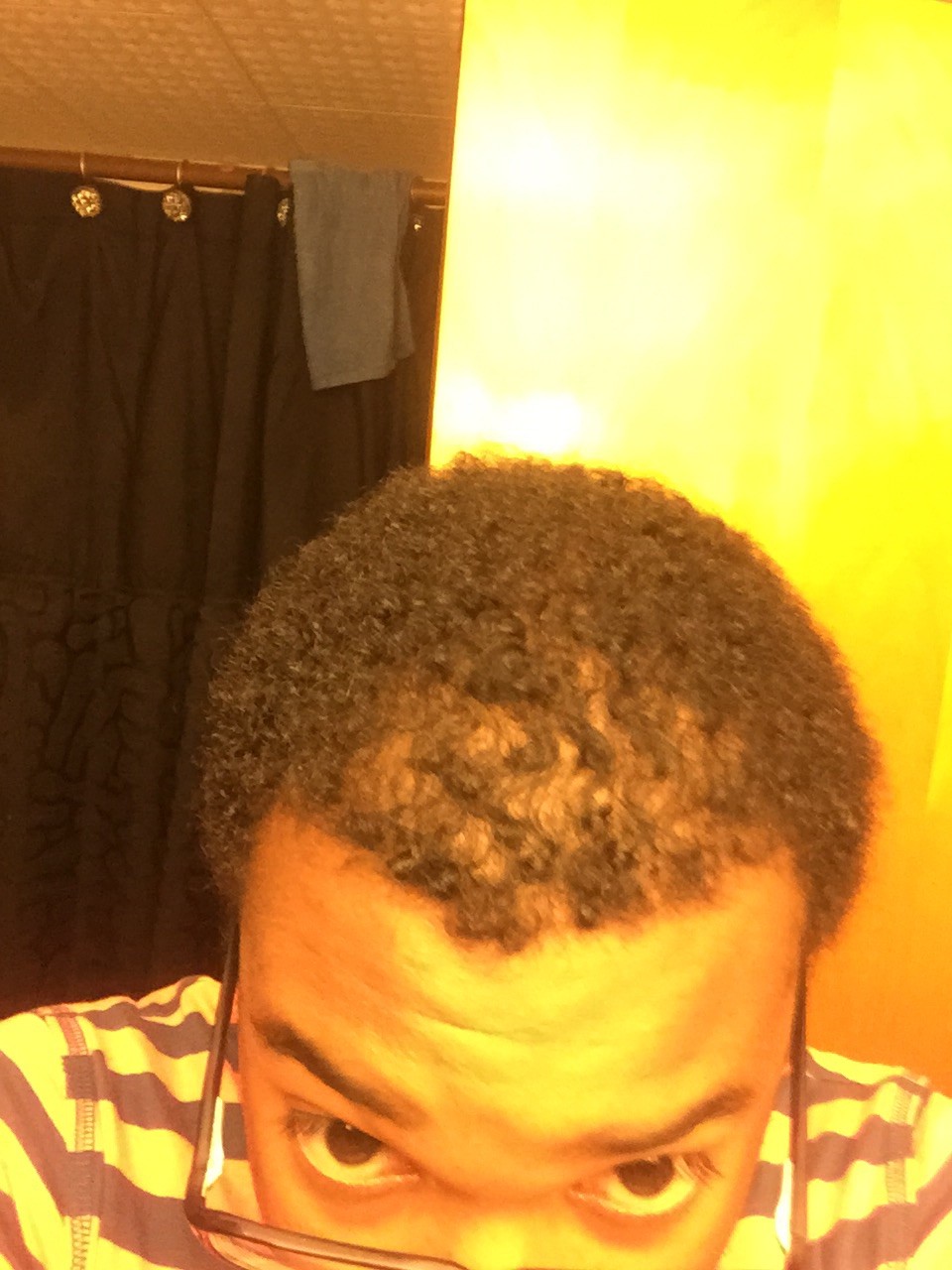I have had more transplant in the past than I care to mention including the old fashion scalp reductions and have been stuck with weaves and wigs ever since. The SMP procedure is the most marvelous procedure ever. It got rid of all scarring from my transplants including the scalp reduction scar. I am a very successful businessman, who before I had the SMP put me in the prison of Wigs and the like. My confidence is now solid and the procedure has given me my, as Sinatra would say, SWAGGER back in life! It has been a life changing experience and I got a ‘get out of jail’ free pass for life.
A young 20 some year old who lost most of his hair realized that no matter how many grafts with hair transplant surgery, he will never have a full head of hair (especially if he kept his hair short). So he just accepted the fact and kept his hair shaved. He still didn’t like the horseshoe balding pattern despite the daily shaving. He decided on the Scalp MicroPigmentation – SMP – approach.
How many grafts can you harvest with surgery?

Maximum number of grafts in one session is dependent on the exam. Doctor needs to determine your hair density and scalp elasticity for maximum harvest. Every person is different and with each surgery the maximum number changes.
The maximum number can be a high as 6000 grafts but this is not typical.
i am 30,having male pattern baldness(loosing hair for last 5-6 years),using minokem n 5% and finpecia 1mg(using last 3-4 years).no impressive result,can i switch to Regaine 5% /Hair 4u 5% /Mintop 5% /Morr Forte 5%.or any other?
please suggest.
If you have genetic male pattern balding (MPB) or androgenic alopecia (AGA), there is no definite medical or surgical “cure”. There are medications to help slow the process or even regrow some hairs but in the long run you will continue to lose hair. Hair transplant surgery helps but it does not stop the inherent balding process. It is a good idea to see a doctor for such treatment options and explore what is possible.
Does low lever laser therapy work for hair growth. I see lots of positive reviews and videos. It’s expensive and I’m not sure if I should try that before Propecia
Lasers in my opinion do not grow hair. I’ve offered it at my practice for FREE. I even gave it away as a study. I have not seen results. Maybe you can claim the patients didn’t use it right.
The studies or papers that are out there do not show clear results. If they work, it is so minimal it’s not worth the effort or cost to justify a result that can not be seen with a naked eye for someone to say “that was worth it”.
Scientifically, these lasers such as Revage 670 are just low power red lasers that emit at a 670 nm wavelength. (thus the designation 670)
670nm is not a magic number wavelength for hair growth.
670nm is the RED wavelength in almost ALL lasers.
The makers of the hair growing lasers didn’t pick 670nm for its hair growing potential
It’s the only one commercially available.
The $1 WallMart laser pointer is ALSO a low power (low level) laser that emits at 670nm
These hair lasers are just a dome or a hat that incorporates 30 of these.
You can make one for yourself for probably under $50.
This is a GREAT marketing and business plan.
Had a FUE about 3 years ago and was very happy with the results. Now, it seems like I have half the hair after the FUE and my hair gets very greasy – like one day after shampooing, it feels oily.
Could the transplant have transplanted extra sweat glands in addition to the hair which is causing this? Or is it because there is less hair now which causes more grease to be absorbed by the remaining fewer hairs?
Also, is it normal to have hair loss after FUE – I am thinking of going again, but if I have to do this every 3 years, not sure if its worth it. I am a norwood 6 so I’m assuming that whatever hair has shed in the last 3 years since the transplant is the actual hair (not the transplanted hair).
Oily or “greasy” scalp / hair is not necessarily related to a hair transplant surgery. You may want to see a dermatologist or follow up with your hair transplant surgeon for an exam.
Transplanted hairs may come with oil glands but it does not mean you would have “extra” glands. You can try using different shampoos.
Finally, it is not normal to lose transplanted hairs after surgery. As long as you have good donor hair (and not losing donor hair) your transplanted hairs will behave the same.
Hello I am a 22-year-old male . I would like to know what type of Balding do I have . I notice little spot At first then started to get thin.
Then My hair in the the Front started to shed But my hairline is not receiving and my hair is not thinning In the back .can someone tell me what’s wrong so I can get help our treatment for it
A doctor usually needs to examine a patient, diagnose a problem (of why you are losing your hair or much more more hair loss you may have in the future), then needs to understand your goals and expectations before giving you options or a treatment plan.
You show early sign of hair loss that suggest you have genetic male pattern balding. If you are concerned you should see a doctor for treatment options.
Why is it that when I started taking Propecia, my hairs all of a sudden started to shed more rapidly? I’ve been seeing hair everywhere now and it isn’t stopping. What can I do?
It takes over 6 months of taking Propecia (finasteride) daily to see results. Taking for 3 week will have not much (if any) effect on your hair. If you lost more hair, it is your genetics winning out.
Taking Propecia does not make your hair fall out. If you lost your genetically susceptible hair, it will likely not grow back.
Have you considered a twist to Observational Bias? Once you start taking a medicine that is suppose to GROW hair, you become acutely aware and interested in your hair status. While expecting impatiently for hairs to grow you notice hairs naturally falling out (as it would normally). Since you would NEVER see results of Propecia in days to weeks, you are acutely aware of how much hair you are naturally losing. This phenomenon would likely be worse for those with Obsessive Compulsive traits.
The opposite to the above scenario are patients who swear they see results of Propecia working in 1 to 2 weeks. This is also highly unlikely.
12
Page 2 of 2






